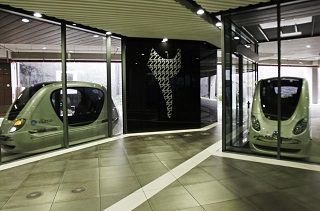Cool Video on the Future of Transportation

While the video makes some fantastic points and presents many important pieces of truth, it ignores a few basic ideas:
• Installing a rail on our 4+ million miles of public roads would be a fantastically expensive proposition.
• Ideal transportation systems are multimodal. It’s not practical for one form of transportation to provide the optimum means to go to the grocery store, to a neighboring city, and to the nearest ski resort.
• Paying by the mile (as the speaker suggests) puts undue burden on poor people.
• Ripping up the entire multi-trillion dollar transportation industry is highly impractical, both economically and politically.

Much thanks for the post! Here are my replies…
The cost would be huge,no doubt. But that must be compared to the cost of doing nothing. And keep in mind, most people see what we have now as unsustainable.
If you consider the automobile / truck / motorcycle / bus system to be multimodal, then so is this concept. I didn’t elaborate on this point in the video, but you would definitely have variants of the vehicle for handling different purposes…carrying freight, putting out fires, etc.
Paying by the mile only insured that people don’t assume that energy is free. If you want to let poor people ride free, that’ s fine…it’s certainly not a technical issue.
This system does NOT rip up the existing infrastructure…it’s builds atop it. That’s an important distinction. And speaking of economy, what would be the gain for a nation that increases the efficiency of their transportation system by 100% for example? Finally, keep in mind that we’ve done large infrastructure projects in the past when necessary…building the infrastructure to begin with, so it’s reasonable to assume that we could do it again.
gary
There is no doubt that what we have here is unsustainable – and for a variety of reasons. It’s a threat to national security, it’s irreversibly damaging the environment, and, as you point out, the congestion it causes can only get worse.
And I do think the future will see dramatic change; I predict that we’ll have one brave bold city that does something completely different. Apparently, Las Vegas is envisioning an overhaul (though not in the direction I think it should happen). If I were doing this, I’d build high-speed rail from Los Angeles, and I’d expand the tram system to include “downtown,” the airport, and the entirety of the strip. Once this happens somewhere, it will serve as a model for making it happen everywhere.
I’m sure you’re aware of Dan Sturges, who claims, and I think he’s right, that since we have different densities of cities (e.g., Manhattan vs. Los Angeles), we need different approaches that solve the “last mile” issue in an appropriate manner.
I believe you need to rethink your claim that this can be done quickly. Even if it’s installed at a rate of 1000 miles a day, that’s more than 10 years. You also should have a grasp on the cost; advocating an idea without knowing what it will cost puts you in a fairly weak position, I believe.
By the way, “rip up” was a terrible choice of words on my part; I meant it figuratively, i.e., dismantle economically, render useless (and profitless). That is the real issue; the entire multi-trillion dollar transportation sector will fight your idea tooth and nail. You’ll be fighting the oil companies and the car companies.
I think that the automobile is the ONLY current transportation system that solves the last mile problem. And since my system would take over all of those roads, it would solve the last mile problem as well, regardless of the density.
You’re absolutely right in that I can’t prove it could be done fast enough or within an acceptable cost…it’s just my gut feel as an engineer. I haven’t quit my day job.
As for the multi-trillion dollar transportation sector fighting the idea, that’s not a technical argument, so it doesn’t concern me. But if you think about it, if such a system could be built it would unquestionably use less energy than any other system you can imagine (all electric with no batteries). And if it does that, it will have the least impact on our environment, climate change in particular. If doing nothing ultimately caused, as a hypothetical example, the Monarch butterfly to go extinct, is doing nothing an acceptable cost?
gary